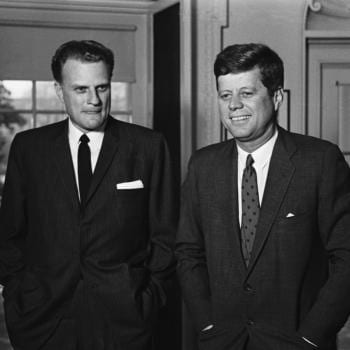Supposedly the rise of Protestantism upended the glorious harmony of Christendom and the Roman Catholic Church. In books like Brad Gregory’s The Unintended Reformation, Protestantism sowed seeds that led to the triumph of selfish capitalism over communal solidarity, scientific expertise over theological insight, the tyrannical state over the caring church, philosophical relativism over moral clarity, and even Walmart over the local hardware store. In other words, the Reformation divided the church, disrupted social relations, and removed the sacred canopy that gave unity and civilization to medieval Europe.
With all of those good things going for Christendom, how in the world did William of Occam come along a century-and-a-half before Martin Luther? Why is Occam important? Because he developed the philosophical tradition of nominalism. According to its rival, philosophical realism:
So a table is really a table with a purpose—to hold other objects, or a set of dinner plates. But this is not so with nominalists. For the nominalist, there is really no such thing as a ‘table.’ As Dreher puts it, “A table is just wood and nails arranged in a certain way, until we give it meaning by naming it ‘table’”—hence the term nominalism, which is from the Latin nomen, the word for name (to paraphrase Dreher’s etymology).
For the nominalist, the table has no inherent meaning—its meaning is merely something extrinsic, imposed from without. This may not seem to matter much when we’re talking about tables, but it takes on serious implications which we talk about reality in general and our place in it. If the world has no meaning, it has no purpose and it cannot point to the Creator who made it.
Notice too that this nominalism made straight the way for the Reformation:
It means that in Genesis, when God called creation ‘good’—it was only because He said so, not because it was really good. It also contravenes the testimony of the Old Testament, where creation as seen as reflecting the beauty and goodness of God—Dreher quotes Psalm 19:2, “The heavens declare the glory of God.” Finally, Ockham’s position is at odds with the reality of the Incarnation itself, along with the reality of the visible Church and the sacramental system. (Certainly it is now apparent how nominalism helped pave the way for the Protestant Reformation.). . .
In this way it was only a natural transition from believing in a God who imposed meaning on things to thinking it was man who did this. We can see this mindset well-illustrated in our society’s acceptance that marriage and gender mean whatever people say they mean.
Of course, it took us many centuries and quite a few revolutions to get us from William of Ockham to today. (And, it must be noted, not everything has been downhill since then!) But understanding how it all began is the first step towards recovery and restoration.
This means that the decline of the West started almost two centuries before the Reformation.
It means that the decline of the West began while Roman Catholicism was the dominant religious force in Europe.
It also means that if you want to blame a church for the woes of the modern world you need to go to the source — the Roman Catholic Church.
Chronology matters.












